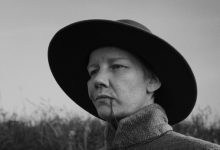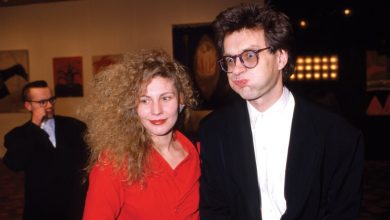Susie Wolff Is Putting the F(emale) in F1
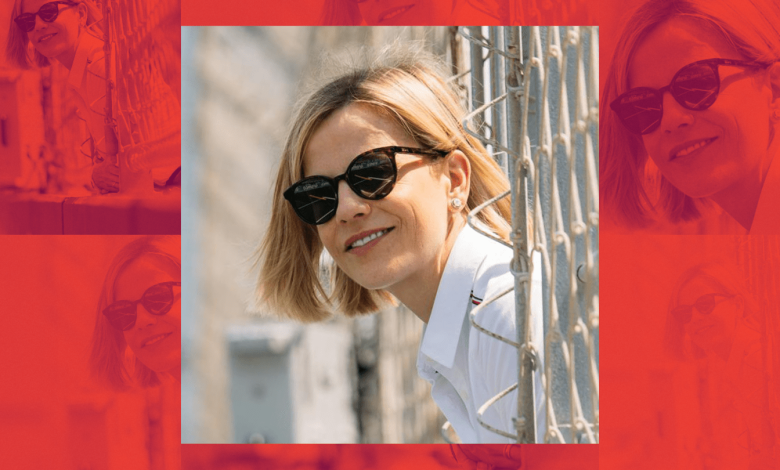
Male-dominated sport? No problem. That’s the attitude Susie Wolff adopted before she went full throttle into the racing world.
The 42-year-old former professional racing driver and current managing director of F1 Academy — a female-only racing league — is using her experience and expertise as the most recent female driver to get behind the wheel of a Formula 1 car during a Grand Prix weekend to help clear a path for other women in motorsport.
In just two F1 Academy racing seasons (and currently in its third), Wolff has already made huge steps forward with the program designed to develop and promote female talent in motorsport, and now F1 fans, and maybe even some new ones, can witness the impact of the league with Netflix’s new docuseries, F1: The Academy, produced by Reese Witherspoon’s Hello Sunshine.
Wolff tells The Hollywood Reporter the series is “showing that the sport they love is no longer just a man’s world because without Formula One, Formula One Academy wouldn’t exist. … And I think by sharing these incredible human stories of these young drivers and their journeys, the challenges they faced, it really brings to life the fact that regardless of gender, there’s an opportunity in the sport.”
Below, Wolff opens up about the stigma around female drivers and fans, her goals with F1 Academy and the Netflix series, if she ever misses being the one in the race suit and what she’s most proud of so far.
Female interest and viewership in F1 and motorsport have grown in recent years thanks to shows like Netflix’s Drive to Survive. How do you hope this series casts a larger spotlight on how F1 Academy is paving the way for women in the sport?
Well that growing female fan base that you’ve alluded to, I think first and foremost it’s important that they see the sport they love is creating opportunity for female talent. It’s showing that the sport they love is no longer just a man’s world because without Formula One, Formula One: Academy wouldn’t exist, and the stakeholders of the sport, Formula One, the 10 Formula One teams, have really got behind it. Also, we want to attract a new audience. We want to attract that next generation, the parents of the next generation, to challenge the idea that women can’t be racing drivers, that it’s an industry that’s not really built for women. And I think by sharing these incredible human stories of these young drivers and their journeys, the challenges they faced, it really brings to life the fact that regardless of gender, there’s an opportunity in the sport.
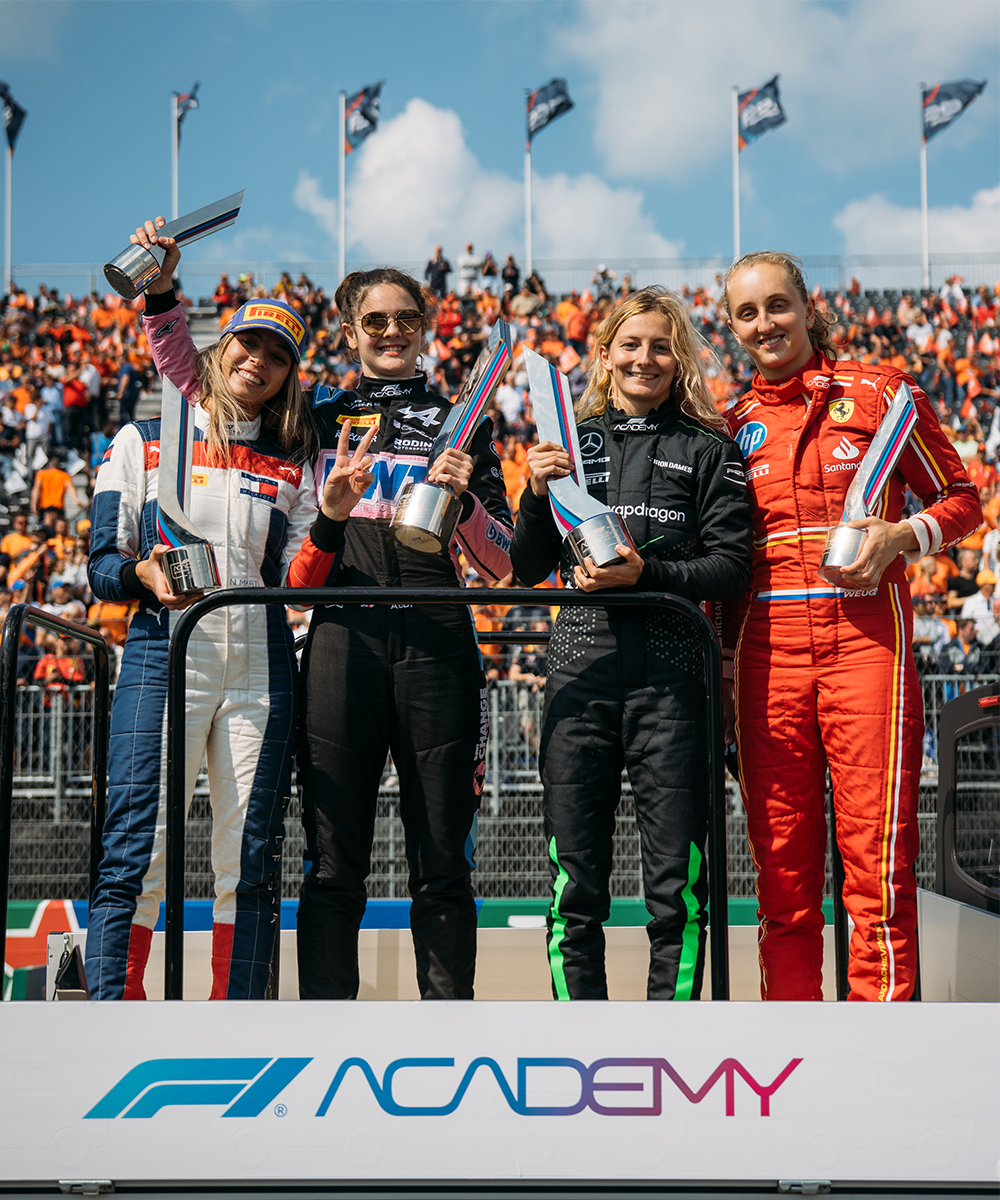
In the series, you’re very caring of these girls but also tough. As the managing director, how do you navigate that tough-love approach?
It was really tough, Carly, because I think one of the big advantages I had was I raced from 8 years old, so I know exactly what they’re going through, the challenges, the tough moments. I almost made it to Formula One, so I know what’s coming next for them. And it really was the balance of trying to create this environment where they felt they could excel and progress and be surrounded by the best talent in the junior teams, but I also didn’t want to shy them away from the reality of how tough it’s going to be. And the sport isn’t segregated, so to build a career in motorsport, you need to be good enough to race against men, and it is very competitive. So it was just trying to strike that balance between really feeling that I was with them, that I was supporting them and trying to help them be the best they could be, but not losing sight of the overall reality because I’m the one that’s got to make it all function over the long term, and these drivers need to know that pressure is part of the game. There is only ever one winner, and it’s how you pick yourself up and carry on after the failures that will define how successful you are in the long term.
Having been so immersed in the motorsport world since you were young, why do you think there’s still a stigma around female drivers and fans?
Well we hope that this series is going to challenge that stigma, because I think you’re absolutely right, there is still a bit of a stigma, but I do see it changing. The fact that this young fan base exists, I think there’s more expectations from the next generation of women, and I think it’s important that they see this sport they love is doing something to challenge this misconception and this stigma that racing isn’t for girls, because the sport recognized, well, we have a huge female following, and it recognized that it had to do something to create more opportunities for young women. So I hope by both those things, we are creating an even larger female fan base that can feel represented more.
Since you’ve seen how the sport has changed over the decades, what are your thoughts on where it currently stands?
It’s progressed massively because I was often the only one [female], and now we obviously have F1 Academy that exists, which I never thought in my lifetime I would see, and it just shows how much progress that we’ve made in a short space of time. But I think the sport’s global popularity has never been so big. I was lucky enough to watch the F1 movie last night, and the technical director in Brad [Pitt’s] team was a woman, there was a mechanic that was a woman. And that was just normal now for us to see, it’s not something that felt out of place, and I think 10 years ago, that wasn’t the case. So I do think we’ve made an incredible amount of progress in a short space of time, but I still think we’ve got to keep our foot flat on the gas pedal, excuse the pun, because there’s more that we can achieve still.
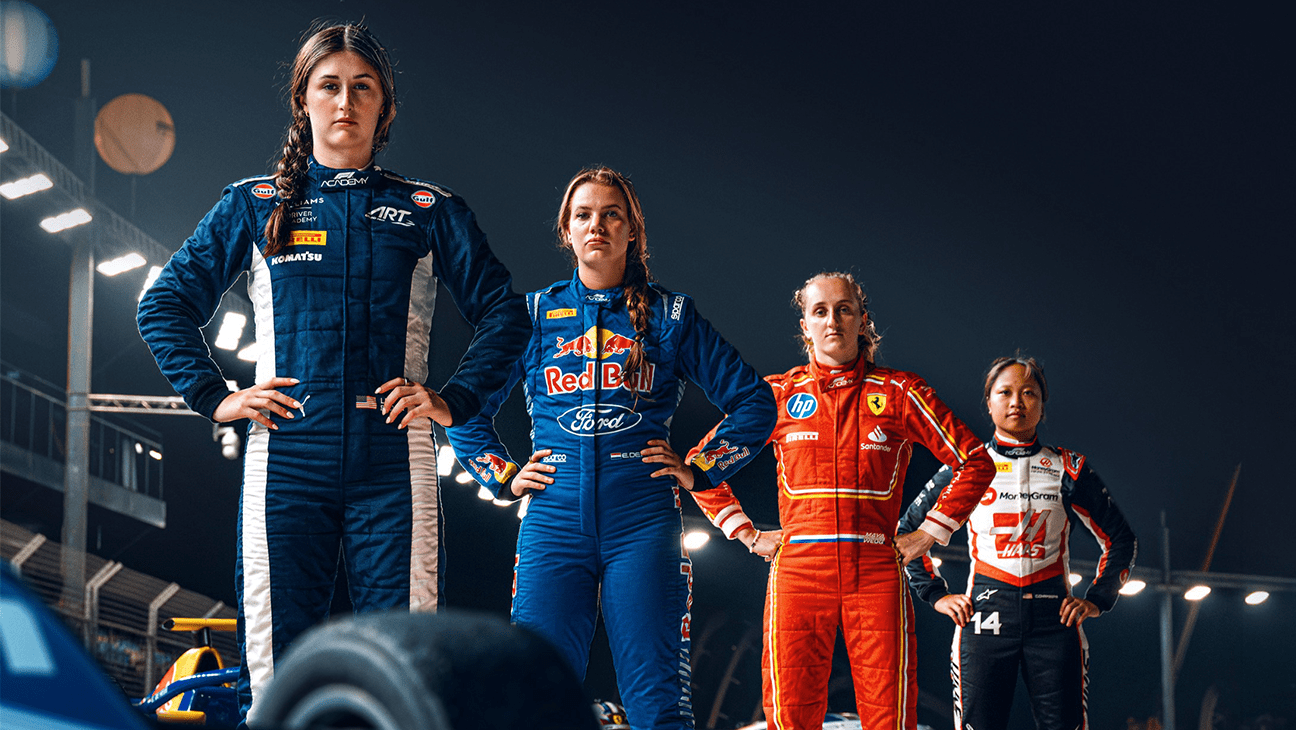
Though F1 Academy is just a few seasons in, when do you think we’ll potentially see another female driver on the F1 grid?
It’s something I would love to see, but it’s not my definition of whether we’ve been successful or not, because I think the impact we can have in inspiring the next generation, increasing the talent pool, making sure that our most talented drivers go on to progress up the sport, that for me is the midterm. Of course, I want to see a woman on the grid, and I think that will be inevitable when we get the building blocks in place that we know we have to do for long-term success and without a doubt, that will be a proud moment when we see a woman take to the grid. You know, there’s only two spots in the grid [per team], and it’s very, very tough to get to Formula One, so we’ve got to make sure that we put the right steps in place that a woman has that chance in hopefully the not-too-distant future.
What was it like working alongside Witherspoon’s Hello Sunshine to bring the docuseries to life?
I feel very privileged that I got to work with the Hello Sunshine team, the Netflix team. Obviously the Netflix team, they made Drive to Survive, they know what it takes to make a great docuseries. Hello Sunshine was versed in bringing women’s stories to life. So it really was for me the perfect partnership, and it was a real privilege to be a part of that group because I think we’ve created something that I hope will challenge people’s perception, bring these human stories to life, and even if we can have a smaller amount of success that Drive to Survive did, it will really shift the momentum of F1 Academy.
How have you used your experience and expertise in the sport to help guide you with developing this program?
I leaned massively on my own experience, having been a racing driver through all the various levels, but also having run a team. I also was not scared to go out and to the people I respect in the sport, I wanted to know everyone’s opinion, “What can we do to make this a success? What’s your opinion as to why there’s not more women in racing? What can we do?” Also people that weren’t very versed in motorsport, I said, “What’s your opinion?” I wanted to really gather as much intel as I could because I knew we had one chance to get this right, and if we could get it right, it could have a massive impact on the sport, and if we got it wrong, I think it would take a long time for another chance like this to come. And I’m incredibly grateful that people gave me the time, that people gave me the trust and the responsibility for setting this up for success, because now I feel a huge amount of pride in the opportunity we’ve created for these drivers, but the shift we see in the sport of removing the stigma and the preconceptions that it’s not a world which is welcoming to women.
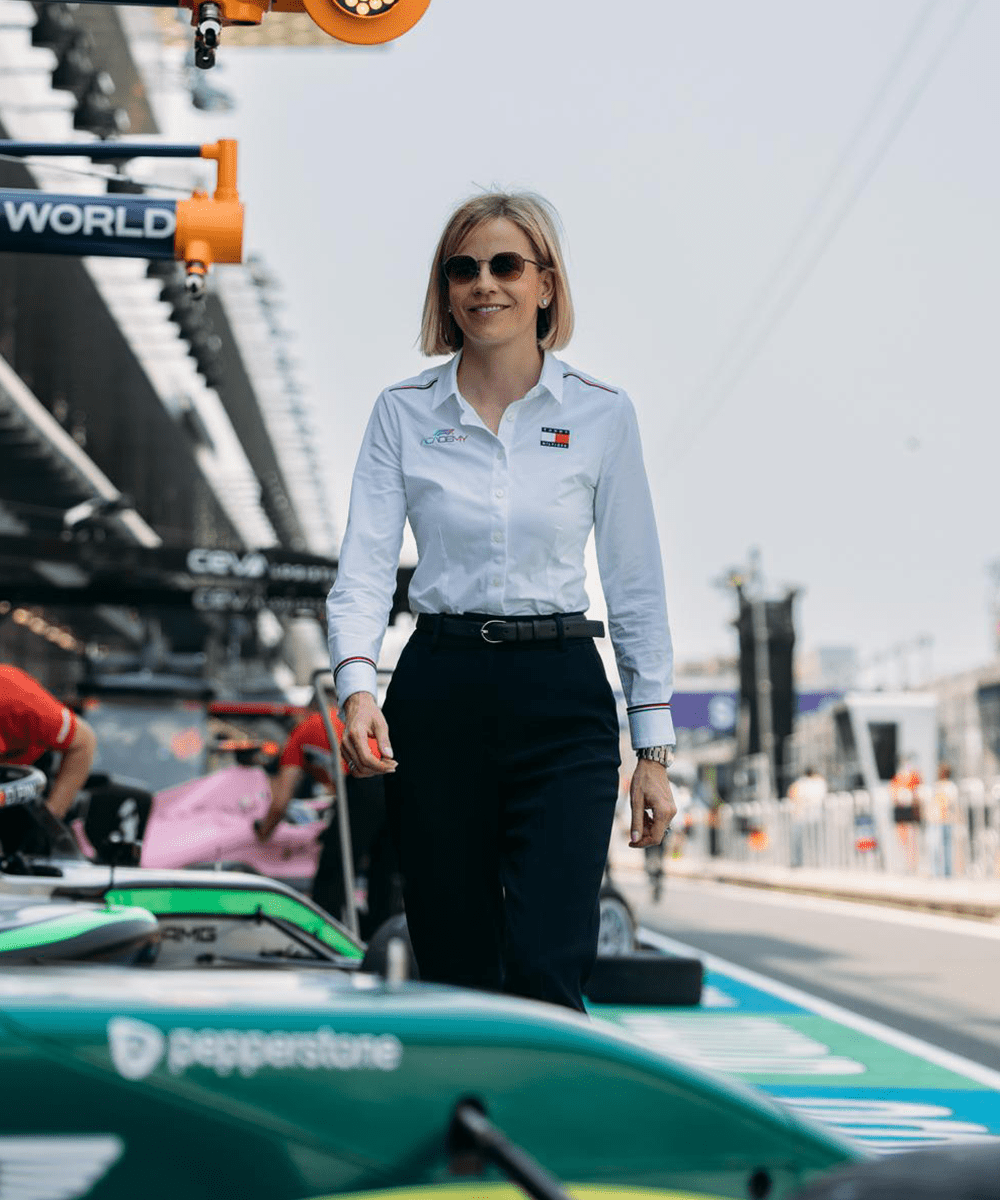
Seeing what all these incredible young drivers are doing, do you ever find yourself missing when you were the one in the race suit and competing?
Zero! Been there, done it, got the T-shirts (Laughs). If anything, when I watched some of the footage back, because I obviously have a lot to do on a race weekend, I’m not with the drivers a lot, but I got quite emotional when I saw how emotional the drivers got because I know what it’s like to have a tough race day and I know how hard it is to pick yourself up afterwards, and I know how much a lot of them are sacrificed and given. So it was emotional to see, and there were certain drivers that I had to go and say something to because I said, “Listen, I’ve been where you are now. I know how tough that is,” but I also loved seeing the special moments of the drivers that won that made it onto the podium because standing on a podium on an F1 race weekend in a suit of an F1 team, that’s an experience which I could never even dreamed of when I was racing, and that’s possible for them and to have that opportunity so early in their careers is something which is quite special.
It probably brings back positive and negative memories, then.
You know what I realized — and they’re different from my husband [Toto Wolff, CEO and team principal of Mercedes-AMG PETRONAS F1 Team], who obviously needs his team to do well — I can watch a race and not be stressed about who wins. I can watch it and actually know that as long as it’s great racing, we’ve had a good day’s F1 Academy. I can celebrate with the with the winner, whoever won on that day. So it does take a bit off the pressure to deliver every race again.
What are you most proud of regarding what you’ve accomplished with the F1 Academy program and your career overall?
I never really take the time to look back — I feel like I’m in the midst of my career — to think what I’ve done well. I feel very grateful that I’ve had such a career in the sport that I got to spend so many years as a racing driver. I made it to Formula One as a test driver, and now I feel grateful also to have this great opportunity with F1 Academy, and I hope when I have more time, I can look back and say, wow, it was so great to be a part of that, and to be part of a team which brought such a vision to life and created this amazing opportunity for young women.
***
F1: The Academy is currently streaming on Netflix.
Source: Hollywoodreporter
HiCelebNews online magazine publishes interesting content every day in the TV section of the entertainment category. Follow us to read the latest news.
Related Posts
- Cate Blanchett, Afghan, Syrian Creators on Fund for Displaced Directors Backing “Surprising Narratives”
- Meghan Markle Gets Real About Money and the 'Guilt Mentality Surrounding Having a Lot'
- Hugh Jackman's ex speaks of 'betrayal' as divorce is finalized
- Barry Diller and the Twilight of the Hollywood Tell-All
- Jackie Chan (left), Ben Wang and Ralph Macchio in 'Karate Kid: Legends.'
Jonathan Wenk/Columbia Pictures
…




